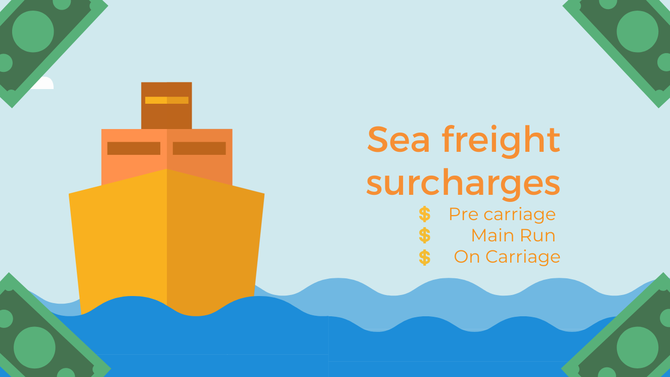You want to ship your cargo and you receive an offer on which countless abbreviations and technical terms are summarized. All of these stand for fees that can be added when transporting sea freight. It never hurts to look at a bill again. If you can then decipher what fees have been listed and check their relevance for your own transport, nothing can go wrong.
You are looking for cheap transports, use our free freight search engine:
How are the costs divided?
To get you an easier overview, we have divided the costs between the three transport steps pre-carriage, main run and on-carriage. Some of these costs can occur with multiple transport steps. An example of this are, e.g., fuel surcharges, which are required for both the pre- and on-carriage. Note that some carriers use different abbreviations for these surcharges.
Pre-Carriage Surcharges
With the surcharges for pre-carriage, you will mainly find fees that cover the costs of transporting your cargo to the port. This includes not only the transport itself, but also the following points.
- Fuel Surcharge: Here, the fuel needed to carry your cargo is charged.
- Chassis Utilization Surcharge: For transport to or from the port, chassis are used, which are provided by the shipping companies. This costs are therefore often found in the on-carriage.
- Wharfage: This surcharge is determined by the quay or dock owner and is paid for using this quay.
Additional costs are incurred by the bureaucracy. These include::
- Customs clearance: Fees charged by the customs agent for customs clearance of your cargo
- Document Fees: Export documents, certificates of origin and many other papers must be issued.
Main-Run Surcharges
The main run probably has the most surcharges. Although it seems quite simple at first, there are many small steps during the actual transport, all of which have to be billed. The main run covers not only transport at sea, but also everything that has to do with the handling of the cargo at the port of loading and unloading.
- THC (Terminal Handling Charges): These charges cover the handling of the containers at the port of origin.
- BAF (Bunker Adjustment Factor): This amount is intended to compensate for fluctuating fuel prices. This surcharge is often also called FAF (Fuel Adjustment Factor) or Fuel Surcharge.
- CAF (Currency Adjustment Factor): The same principle is applied to foreign currencies in order to compensate for fluctuations.
- ISPS (International Ship and Port Facility Security): This surcharge will compensate for the security burden at seaports if the need for it is increased.
- OWS (Overweight Surcharge): If the maximum standard weight of a container is reached, a surcharge is calculated here.
- LSFS (Low Sulphur Fuel Surcharge): Costs for shipments passing through the emission control areas.
- Hazardous Surcharge: Fees for the transport of hazardous goods.
- Piracy Surcharge: This compensates for the effort involved in preventing piracy.
- PSS (Peak Season Surcharges): This is the surcharge for peak seasons.
- SCS (Suez Canal Surcharge)/GAS (Gulf of Aden Surcharge): These are costs that are calculated for passing these channels.
On-Carriage Surcharges
As already mentioned, the costs of pre- and on-carriage often double. These include the Chassis Utilization Charge, Customs Clearance, Fuel Surcharge or Wharfage. However, there are also costs, which are only due for on-carriage.
- DTHC (Destination Terminal Handling Charge): This surcharge is the equivalent of THC, but only applies to the port of arrival.
- DDC (Destination Delivery Charge): This covers the cost of lifting the container from the ship and the delivery costs.
- Release Fee: The destination port charges a fee for the release of cargo./li>
- Demurrage: These costs are incurred if the deleted container is not picked up from the port area on time.
Your are looking for a partner with transparent cost report for you recurring transports? Then sign up at our Major Customer Portal!
